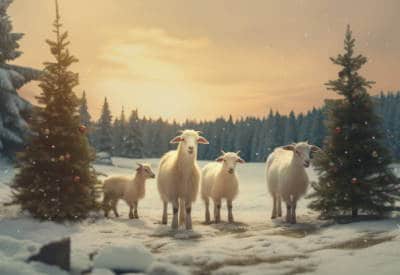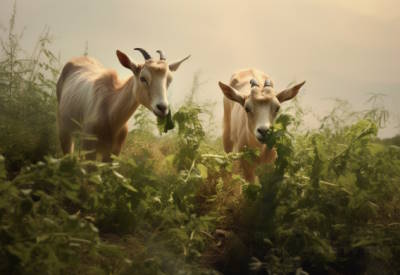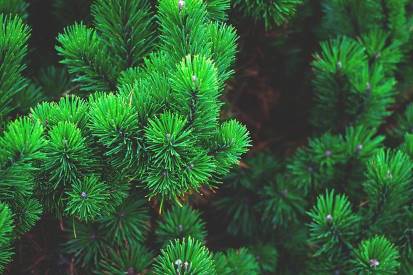Can goats eat Christmas trees? Yes, they can, and I’ve seen it firsthand. Growing up on a farm with a lively bunch of goats, every year after the holidays, this question would naturally arise.
From my personal journey with goats and countless festive seasons, I’ll share what I’ve learned about this interesting mix of holiday cheer and goat diet. Let’s dive in!

Background on Goat Diets
Ah, goats. Those lively creatures with a penchant for climbing and a rumored appetite for, well, just about anything. Dive with us into the intriguing world of what goats really eat and dispel a few myths along the way.
The basics of what goats eat
Despite their adventurous reputation, goats aren’t out here gobbling down everything in sight. At their core, they’re herbivores with a preference for plant materials: think leaves, grasses, and shrubs.
The adaptability of their digestive systems
Being ruminants, goats come equipped with a stomach designed to break down tough plant materials. This unique digestive structure enables them to munch on a diverse range of plants, but that doesn’t mean they’re immune to harmful substances.
Common misconceptions about goat diets
Ever heard tales of goats chomping on tin cans? While they might nibble out of curiosity, it’s not a dietary preference. They’re more into exploring their surroundings than searching for an unconventional snack.
[GoatAffiliate]
Understanding Christmas Trees: Different Types
Before you hand over that post-holiday tree to your herd, it’s vital to recognize what’s on the menu. Not all Christmas trees are created equal, after all.
The common species of Christmas trees
The Douglas Fir, known for its delightful aroma, and the durable Blue Spruce are just two of many Christmas tree varieties. Each has its distinct characteristics that might appeal to a goat’s palate.
Physical characteristics of each species
The feel and texture of the tree are worth considering. While the White Pine boasts soft needles that might seem harmless, other varieties like the Scotch Pine come with a prickly disposition.
Chemical components and potential toxins in various tree types
Nature is tricky; some trees have natural compounds that could be less than ideal for our goat friends. Awareness is key.
Potential Benefits of Feeding Christmas Trees to Goats

If you’ve got a tree and a curious goat, there might be some advantages to letting them indulge, with a few caveats, of course.
Natural foraging behavior
Letting goats have a go at a Christmas tree can mimic their natural behavior in the wild. Foraging keeps them mentally stimulated and taps into their inherent instincts.
Nutrient content in pine needles and bark
Beyond the fun of exploration, some parts of the tree might offer nutrients beneficial to goats, given they’re consumed in moderation.
Enrichment and entertainment for goats
Let’s face it; a tree in their pen can be a source of amusement. Goats enjoy variety in their environment, and a tree can offer hours of investigative fun.
Possible Risks and Concerns

However, it’s not all festive joy. There are a few things to watch out for when introducing a Christmas tree to your goat’s environment.
Presence of pesticides or chemicals on commercially grown trees
Many commercial trees are treated with chemicals to maintain their lush appearance. These can be harmful if ingested.
Sharp pine needles and potential for internal harm
While goats are resilient, sharp pine needles can pose a threat, causing internal scratches or other injuries.
Resins and sap: Can they be harmful?
Some trees ooze sap and resins which, in large amounts, might not sit well with a goat’s stomach.
Practical Tips for Offering Christmas Trees to Goats
If you’re set on giving your goat this unique treat, here are some tips to do it safely.
- Ensuring the tree is free of decorations and tinsel: It goes without saying, but all decorations should be removed. Anything shiny or small can be a choking hazard.
- Checking for mold growth on an old tree: If your tree has been indoors for a while, inspect it for mold, which can be harmful if consumed.
- Gradual introduction to a goat’s diet: Like any new food, it’s best to introduce it slowly. Monitor your goats for any signs of distress or discomfort.
What other trees can goats eat apart from Christmas trees?

Beyond the festive firs and pines we associate with the holidays, there’s a vast world of trees out there. Goat owners, whether seasoned or just beginning, often wonder about the safety of various trees and their parts when it comes to goat consumption. Let’s explore some common trees and their palatability for our hoofed friends.
Pine Needles
Pine needles, in moderation, can be a treat for goats. They often enjoy the taste, and these needles can offer certain nutrients. However, like anything, it’s essential not to overdo it. Too many pine needles can potentially lead to digestive issues, so always monitor their intake.
Read More: Can Goats Eat Pine Needles? 5 Important Benefits
Oak Leaves
Caution is necessary here. While goats might munch on oak leaves, they contain tannins, which, in large amounts, can be toxic to them. It’s best to keep goats away from large quantities of oak leaves, especially if they’re wilted, as they can be particularly harmful.
Read More: Can Goats Eat Oak Leaves? 6 Great Benefits
Maple Leaves
Maple leaves can pose a significant risk, especially if they’re wilted or dried. Certain types of maple leaves, like those from the red or silver maple trees, can be toxic to goats when ingested, leading to conditions like hemolytic anemia. It’s advisable to prevent access to these leaves, especially during the fall when they tend to drop and dry up.
Read More: Can Goats Eat Maple Leaves? Simple Answer & Feeding Tips
Cedar Trees
While cedar trees aren’t inherently toxic to goats, they aren’t the first choice for a nutritional snack either. Some goats might nibble on cedar out of curiosity, but it’s not something they’d typically consume in large quantities. Plus, the strong aromatic oils can be off-putting to some goats.
Read More: Can Goats Eat Cedar Trees? 6 Excellent Benefits
Magnolia Leaves
Magnolia leaves aren’t toxic to goats, and these animals might occasionally snack on them. They can be a part of a varied diet but, like all tree parts, shouldn’t be the mainstay of their dietary intake.
Read More: Can Goats Eat Magnolia Leaves? 5 Important Benefits
Can goats eat christmas trees – final thoughts
So, can goats eat Christmas trees? Absolutely! But as we’ve discovered, it’s not as simple as just tossing your festive fir into the pen. Remember, while goats have a curious appetite, it’s crucial to ensure that the tree is free from harmful chemicals, sharp needles, and any sneaky decorations that might still be clinging on.
Wrapping it up, think of it as giving your goat a seasonal snack with a side of caution. Ensuring their safety while letting them enjoy a piney treat is the best gift you can offer post-holiday.
Related Articles:
